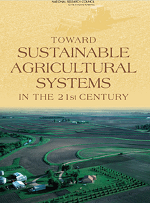_Toward_Sustainable_Agricultural_Systems in the_21st_Century
- In the last 20 years, there has been a remarkable emergence of innovations and technological advances that are generating promising changes and opportunities for sustainable agriculture, yet at the same time the agricultural sector worldwide faces numerous daunting challenges. Not only is the agricultural sector expected to produce adequate food, fiber, and feed, and contribute to biofuels to meet the needs of a rising global population, it is expected to do so under increasingly scarce natural resources and climate change. Growing awareness of the unintended impacts associated with some agricultural production practices has led to heightened societal expectations for improved environmental, community, labor, and animal welfare standards in agriculture. Toward Sustainable Agricultural Systems in the 21st Century assesses the scientific evidence for the strengths and weaknesses of different production, marketing, and policy approaches for improving and reducing the costs and unintended consequences of agricultural production. It discusses the principles underlying farming systems and practices that could improve the sustainability. It also explores how those lessons learned could be applied to agriculture in different regional and international settings, with an emphasis on sub-Saharan Africa. By focusing on a systems approach to improving the sustainability of U.S. agriculture, this book can have a profound impact on the development and implementation of sustainable farming systems. Toward Sustainable Agricultural Systems in the 21st Century serves as a valuable resource for policy makers, farmers, experts in food production and agribusiness, and federal regulatory agencies.
- 599 pages
In the last 20 years, there has been a remarkable emergence of innovations and technological advances that are generating promising changes and opportunities for sustainable agriculture, yet at the same time the agricultural sector worldwide faces numerous daunting challenges. Not only is the agricultural sector expected to produce adequate food, fiber, and feed, and contribute to biofuels to meet the needs of a rising global population, it is expected to do so under increasingly scarce natural resources and climate change. Growing awareness of the unintended impacts associated with some agricultural production practices has led to heightened societal expectations for improved environmental, community, labor, and animal welfare standards in agriculture.
Toward Sustainable Agricultural Systems in the 21st Century assesses the scientific evidence for the strengths and weaknesses of different production, marketing, and policy approaches for improving and reducing the costs and unintended consequences of agricultural production. It discusses the principles underlying farming systems and practices that could improve the sustainability. It also explores how those lessons learned could be applied to agriculture in different regional and international settings, with an emphasis on sub-Saharan Africa. By focusing on a systems approach to improving the sustainability of U.S. agriculture, this book can have a profound impact on the development and implementation of sustainable farming systems. Toward Sustainable Agricultural Systems in the 21st Century serves as a valuable resource for policy makers, farmers, experts in food production and agribusiness, and federal regulatory agencies.












